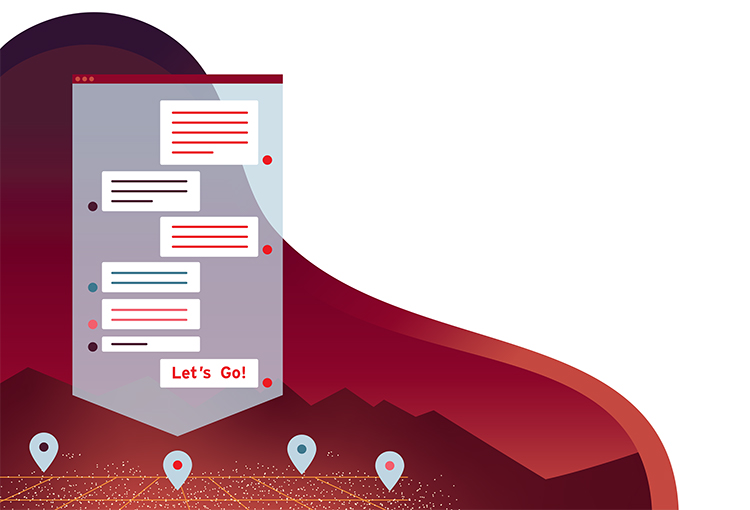From Jakarta to Germany, from Seattle to Seoul, Biolans around the world are discovering an innovative new service that promises to make it better than ever to be Biola alumni.
BiolaHub, which debuted in January at , is a free online social networking tool that gives alumni an easy new way to find job opportunities, form mentoring relationships or simply meet people with common interests. In essence, the website brings together some of the most helpful features of other social networking platforms ‚ÄĒ think LinkedIn meets Facebook without the clutter, ads and unwanted solicitations from strangers ‚ÄĒ all in a setting that‚Äôs exclusive to Biola.
‚ÄúWe are truly so excited about BiolaHub,‚ÄĚ said Lily Tsau, Biola‚Äôs senior director of alumni and parent relations. ‚ÄúThis is a tool that allows alumni to engage in many different ways online. It creates a way for them to have fellowship and community, to be exposed to mentoring opportunities and to find jobs ‚ÄĒ all in one place.‚ÄĚ
Within the first few months, more than 1,000 alumni have already created accounts on this mobile-optimized platform. And leaders within Biola’s Office of Alumni and Parent Relations are hopeful that thousands more will join in the months ahead, making the service ever more valuable and useful to the community.
So, what’s in it for you?

A New Way to Mentor
One of the platform‚Äôs greatest strengths is the ability for alumni to both find and offer mentorship. Mentoring has long been at the top of the list of things that alumni want to participate in ‚ÄĒ and BiolaHub makes it easier than ever, said Don Bernstein, director of alumni outreach and engagement.
‚ÄúIt‚Äôs very simple,‚ÄĚ Bernstein said. ‚ÄúWhen each person signs up, they have the opportunity to say how they want to help. And if they say they want to mentor, it breaks down the different ways you can choose to mentor: Will you meet with someone? Will you review a resume? Will you have a conversation? You can choose the level of mentorship that you want to offer, as well as the frequency that you want to offer.‚ÄĚ
From there, people looking for mentoring or career advice are able to click on BiolaHub‚Äôs ‚ÄúFind a Mentor‚ÄĚ tool to search through a list of the alumni who have signaled a willingness to help. They can filter by location, industry, major, graduation year and other fields, and then reach out to potential mentors directly through the platform.
It‚Äôs a safe and secure system that allows alumni to take mentoring into their own hands, rather than relying on the alumni office to serve as a ‚Äúmatchmaker.‚ÄĚ It also enables mentors and mentees to determine their own terms for the format and frequency of their meetings ‚ÄĒ whether that means a one-time email question, periodic phone conversations or more structured in-person connections.
‚ÄúWith traditional mentoring programs, the regimentation can be difficult for both mentor and mentee ‚ÄĒ like you need to meet at least once a month, or you need to create a report,‚ÄĚ Tsau said. ‚ÄúAllowing the mentor and mentee to work out their own best relationship seems to be much more successful. They don‚Äôt need to go on forever. They have the ability to opt out when they don‚Äôt need it or no longer find it to be useful.‚ÄĚ
And unlike with LinkedIn, for example, young alumni seeking professional mentorship don’t have to feel like they’re imposing or risking rejection by reaching out to someone they don’t know.
‚ÄúYou don‚Äôt have to feel intimidated, because you know that whoever you reach out to has already said that they want to be a mentor,‚ÄĚ Tsau said.

Help for Job Hunters
Another key feature of BiolaHub is its job board, which gives alumni a place both to share and to search for job openings.
‚ÄúOur alumni do very well, and many times they are in companies and positions that will allow them to be able to offer positions and a career path for younger alumni,‚ÄĚ Tsau said, noting the desire that many alumni regularly express to recruit Biola students and graduates.
The ‚ÄúPost a Job‚ÄĚ feature is a direct and easy way for any BiolaHub user to share job opportunities ‚ÄĒ whether the poster is a business owner, a hiring manager or even a would-be coworker who knows of an opening and wants to share it with Biola alumni. The feature makes it possible to link off to job postings on external websites or to welcome applications directly through the BiolaHub system.
The jobs section within BiolaHub also provides direct access to Handshake, an additional job search platform offered through Biola‚Äôs Office of Career Development, which compiles thousands of job and internship opportunities and allows job seekers to receive updates about events and jobs relevant to their specific interests. (Meanwhile, beyond BiolaHub and Handshake, the Office of Career Development offers numerous other resources for both employers and job seekers, including career expos, mock interviews, networking events, a job shadowing program and more ‚ÄĒ all of which can be found at biola.edu/career.)

Community and Connection
In addition to mentorship and employment, BiolaHub also offers a great opportunity to reconnect with old classmates, make brand new connections and get plugged into the broader community, Tsau said.
This can happen in a number of ways. First is the home ‚Äúfeed,‚ÄĚ similar in design to Facebook, where any BiolaHub user can post updates, photos, announcements or questions for the full alumni community to see. In the first few months, users have shared everything from event invitations to personal life updates to requests for home-hunting advice. As with Facebook, the feed allows other users to like and comment on posts. But unlike a public alumni Facebook page, it‚Äôs housed in a setting that‚Äôs exclusive to Biola and closed to the public ‚ÄĒ offering a greater sense of comfort and security for those who may be wary of commenting and interacting out in the open on social media, Tsau said.
A second opportunity for connection is BiolaHub‚Äôs ‚ÄúDirectory‚ÄĚ tab, which allows users to search for fellow Biolans by name, geographic region, graduation year, major, profession and other factors. (To maintain privacy, the directory only includes alumni who have signed up for BiolaHub accounts and only publishes information that those alumni designate to be public.)
The online directory has been on the wish list of many alumni for years, Tsau said, and has the potential to be very useful ‚ÄĒ not just for finding and reconnecting with old classmates, but also for making new connections.
‚ÄúOne thing that alumni from any university want is to be able to locate other alumni,‚ÄĚ she said. ‚ÄúImagine I‚Äôm moving out to New York for a new job. It helps to know that I‚Äôve got a community out there. I want to know: Where should I worship? Where are the best schools? Do I need a car? Where should I go to get my car fixed? So, for alumni to be able to connect to a community of their own is so essential.‚ÄĚ
Finally, BiolaHub‚Äôs ‚ÄúGroups‚ÄĚ tab allows users to join smaller groups organized around specific interests, schools or professions ‚ÄĒ such as the ‚ÄúBiola Book Club‚ÄĚ or the ‚ÄúTorrey Honors Perpetual Members‚ÄĚ group. Here, groups can segment off from the main alumni channel for narrower discussions and events that are private to members of the group. As of March, three groups had already been initiated, and Bernstein expects several more to be added in the coming months, including groups for several of the university‚Äôs schools.

Support for Biolans for Life
Though the platform is still in its infancy, Biola’s alumni team has been encouraged by BiolaHub’s strong start, including reaching the milestone of 1,000 total users and more than 400 willing mentors within the first two months of its public launch.
They’re also encouraged by the platform’s strong record at other colleges and universities. Developed by the technology firm Graduway, the platform is now used at more than 400 universities around the world, including large institutions such as Cornell and UCLA and fellow Christian schools in Southern California such as Westmont College and Point Loma Nazarene University. Tsau, who previously worked with the UCLA Alumni Association, said that UCLA’s version of the platform, UCLA One, was highly successful in helping alumni to network.
Already, many ‚ÄúBiolans for Life‚ÄĚ are signaling an excitement about the platform ‚ÄĒ and an eagerness for more alumni to sign up.
‚ÄúOne thing I always get excited about is meeting fellow alumni who share the same passion, the same vision in making the name of Christ known,‚ÄĚ said Jessica Tanoesoedibjo (M.A. ‚Äô17), an alumna and business leader in Jakarta, Indonesia, who is currently pursuing a master‚Äôs in education at Biola. ‚ÄúBiolaHub excites me because hopefully we can stay interconnected with one another, learn from each other about respective regions, and stir each other up in love and good works ‚ÄĒ in whatever field it is, wherever the Lord leads us.‚ÄĚ
For now, BiolaHub is limited exclusively to Biola alumni. But there‚Äôs a good chance it will be opened up to parents, students, staff, faculty and other friends of the university in the coming months, Bernstein said ‚ÄĒ all in hopes of providing the best possible networking and job placement opportunities.
‚ÄúWe want Biolans of really any stripe,‚ÄĚ Bernstein said. ‚ÄúWe want you in. Our alumni need access to that big community.‚ÄĚ
How It Works
Ready to give BiolaHub a try? Here’s how.
- Visit the BiolaHub website. Go to from any desktop, laptop or mobile device. Bookmark the site for future visits.
- Create a profile. Registering is easy! You can quickly sync your info and photo by signing in with LinkedIn, Facebook or Google. Or you can start from scratch with an email address.
- Share how you want to help (or be helped). After setting up your profile ‚ÄĒ including your degrees, graduation years, and work experience ‚ÄĒ indicate whether you‚Äôd like to become (or find) an alumni mentor.
- Start connecting! Reconnect with classmates using the directory. Post or find job openings. Share photos and memories on the main feed. Join the ‚ÄúBiola Book Club‚ÄĚ or other specialty groups.
 ļŕ›ģ ”∆Ķ
ļŕ›ģ ”∆Ķ

.jpg)

